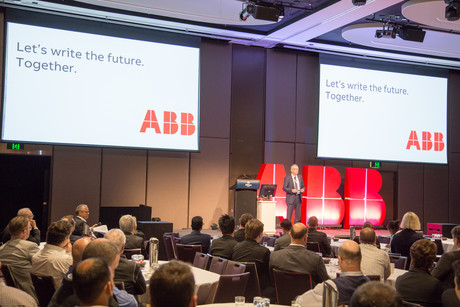Lack of policy driving investments away

One of the world’s largest automation and technology groups, ABB, has blamed lack of policy direction around renewables for discouraging investment in the sector.
The group is working on a number of renewables and storage projects in Australia but remains concerned about the future of the industry. The lack of national energy policy is keeping the billions of dollars that are being invested in other parts of the world from getting invested in Australia, said ABB Australia Sales and Marketing Manager, Power Grids Bill Strohecker on the sidelines of ABB’s recent Digital Transformation Summit in Brisbane. The summit highlighted how businesses in asset-intensive industries like utilities, mining, oil and gas and transport are preparing for and responding to the digital age, both in terms of seizing the opportunities of digitalisation, big data and artificial intelligence, as well as mitigating the risks. Cybersecurity and business transformation to emerging technologies such as microgrids and battery energy storage systems, along with digital substations and their impact on grid stability and asset management were some of the topics covered at the event.
Strohecker is concerned that Australia is a leader in a number of fields but still doesn’t have a national energy policy. ABB has representation on the Clean Energy Council; is proactive through CEDA and AI Group, and is also involved in discussions with the government on the present and future of the industry.
While the lack of policy presents challenges, the group has been strengthening its renewables offering to facilitate growth. In 2011, ABB acquired Powercorp, an Australian renewable power automation company to strengthen its portfolio of control technologies for managing the integration of renewable energy sources.
The group’s products division is still a major revenue contributor, but the share of the service and software portfolio is gradually increasing.
In late 2016, ABB launched Stage 3 of its Next Level strategy to unlock value for customers and shareholders. This included: shaping ABB’s divisions into four units: Electrification Products, Robotics and Motion, Industrial Automation and Power Grids. These divisions were effective 1 January 2017 and are fully operational.
ABB’s traditional markets such as utility/heavy industries and power transmission and distribution continue to remain lucrative, but the group is now witnessing significant growth in non-traditional markets, such as food and beverages, data centres and renewables. ABB Australia Managing Director Tauno Heinola, who has spent 33 years with the group, was appointed MD of the group’s Australian operations in September 2016. He said food and beverages is a major industry in Australia and the group has strengthened its focus on that industry in recent years.
In the food and beverages market, ABB offers a range of segment-specific products, solutions and services for diverse processing and packaging needs across the industry. This includes, but is not limited to, control systems, motors, drives and controls, scalable PLCs and robotic automation solutions, and power monitoring and energy efficiency solutions.
Similarly, as the global dependence on data continues to rise, ABB continues to use its industrial heritage and electrification and automation solutions portfolio to help businesses meet their data demands, offering products and solutions for power distribution, intelligent grid connections, critical power and infrastructure management.
Data centres require a lot of power, electrical equipment and automation systems and that’s where ABB plays a major role — the group offers a range of solutions and systems for the entire life cycle of a data centre. ABB’s data centre solutions include: intelligent grid connection; electrification solutions; industrial automation and DCIM, amongst others.
The group is seeing strong growth in the data centre around the world, a trend which is also reflected in Australia. It’s a significant market, said Heinola, who joined ABB as a sales engineer in the drives business, later becoming the unit’s export manager. After moving to the drives business in Canada in 1990, he founded ABB Beijing Drive Systems with a local partner in 1994, before being given responsibility for ABB’s largest profit centre in the drives business in 1998, based in Finland. He then returned to China to lead the drives business in 2003. Heinola has a Master’s Degree in Electrical Engineering from Helsinki University of Technology.
Compared to the other markets Heinola has worked in, the Australian market is relatively small — this presents a unique set of challenges. The domestic market is not very big and the export markets are geographically far from Australia; and what is even more challenging is that the closest export markets are low-cost countries, said Heinola. The other challenge is high manufacturing costs and declining manufacturing industry.
While the group faces enormous challenges, there are also opportunities, pointed out Bill Strohecker. ABB has a substantial footprint of service operations in Australia and still manufactures in the local market. The group has two manufacturing sites in Australia and also operates three major motor/generator repair centres. Strohecker said that one of the other areas where the ABB business has transformed over the years is in software. ABB has software development divisions in Darwin and Brisbane. The group is involved in developing substantial software solutions in Australia for the global market.
How smart HVAC is creating sustainable buildings
By integrating advanced technology and data-driven strategies, building operators can greatly...
Smelly research could influence HVAC industry
In a dedicated lab space that mimics a tiny house, scientists are investigating the impact of...
Lifestyle community gains a new level of connectivity
GemLife, a developer of over-50s lifestyle communities, was facing challenges with its fixed...




